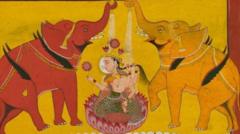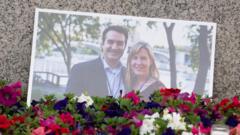Dr. Sneh Bhargava's remarkable career at AIIMS sheds light on a significant historical event while promoting women's empowerment in healthcare.
A Radiology Pioneer Reflects on Indira Gandhi's Last Moments

A Radiology Pioneer Reflects on Indira Gandhi's Last Moments
A groundbreaking female leader in medicine recalls her unique experience during a national tragedy.
Dr. Sneh Bhargava, a trailblazing figure in Indian medicine and the first and only woman to lead the All India Institute of Medical Sciences (AIIMS), reflects on a defining moment in her life that intertwined with Indian history. At 90, she has published her memoir, "The Woman Who Ran AIIMS," which details her extraordinary journey.
In 1984, shortly after being appointed as AIIMS' director by then Prime Minister Indira Gandhi, Dr. Bhargava faced an unimaginable situation on the morning of October 31. While in her office reviewing cases, she was alerted by a colleague to rush to the casualty ward. There, she found Gandhi, critically injured and unresponsive, her sari stained with blood from the assassination attempt by her Sikh bodyguards. Despite the chaos that had erupted outside, Dr. Bhargava's instinct was to prioritize Gandhi's care and safety amidst growing dangers.
As news spread of the prime minister's shooting, India plunged into one of its deadliest riots. Dr. Bhargava recalled arranging for Gandhi to be moved to a secure area while grappling with the reality that the woman who had chosen her for such a prestigious role was already deceased. "For four hours," she writes, "we had to maintain the pretense that she was alive while we knew she wasn't."
The memoir not only chronicles this harrowing experience but also reflects Dr. Bhargava’s influence at AIIMS. Under her leadership, she revolutionized radiology practices, which at the time were rudimentary. She fought to establish radiology as a vital component of patient treatment, advancing the department from outdated techniques to one of the most esteemed facilities in the country.
Dr. Bhargava recounts interactions with key political figures, including a memorable incident with Rahul Gandhi as a child, requiring care after an accident. However, she also faced political challenges, navigating pressures from influential leaders while remaining steadfast in her commitment to patient care.
Born in pre-partition Lahore in 1930, Dr. Bhargava's drive to help others was evident from a young age. After fleeing to India during the partition, her desire to serve led her to study radiology in London as the only woman in her program. Upon her return, she worked tirelessly to meet the healthcare demands of her nation.
She emphasizes that the support she received from her family was crucial in her journey, hoping her story will inspire future generations. "Support for daughters is essential," she asserts, advocating for women to have the opportunities and encouragement needed to break barriers in fields dominated by men.






















